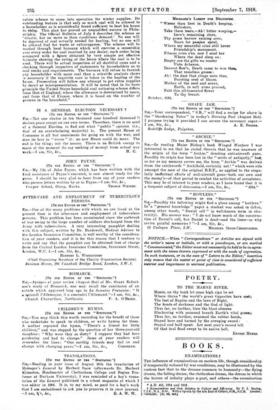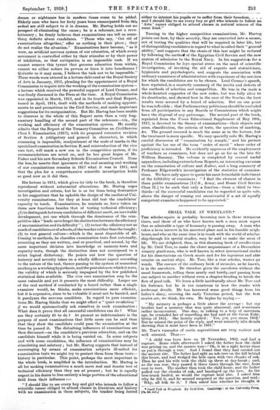BOOKS.
EXAMINATIONS4
THE influence of examinations on modern life, though considerably if temporarily reduced by war conditions, may be illustrated by the curious fact that to the dreams common to humanity—the flying dream, the falling dream, the clothesless dream, the dream in which the horror of infinity plays a part, and others—the examination
* A.D. 451, 1914 and 1918.
I Examinations and their Relation to Culture ma Efficiency. By P. I. Harteg, C.I.H., 13.8e. With as Speech by the late Earl of Cromer, O.K. GRA London ; Constable.' Rs. Od. net' dream or nightmare has in modem times come to be added. Elderly men who have for forty years been emancipated froln this ordeal are still subject to it in dreams. Mr. Hartog holds out no prospect of eliminating the cause ; he is a reformer, not a revo- lutionary ; he firmly believes that examinations'can tell us some- thing definite about candidates. " Those who say, Get rid of examinations altogether,' offer us nothing in their place ; they do not realize the situation." Examinations have become, " as it were, an artificial nervous system of our education, of which every movement is controlled either by their stimulus or by their power of inhibition, so that extirpation is an impossible task. If we cannot remove this tyrant that governs education from within, cannot we either reduce its powers or force it into beneficence ? Quixotic as it may seem, I believe the task not to be impossible." These words were uttered in a lecture delivered at the Royal Society of Arts in January, 1911, pleading for the appointment of a Royal Commission to inquire into the working of the examination system— a lecture which received the powerful support of Lord Cromer, and was freely discussed in the Press at the time. A Royal Commission was appointed in March, 1912, and in its fourth and final Report, issued in April, 1914, dealt with the methods of making appoint- ments to and promotions in the Civil Service, and made important suggestions for its reorganization. But Mr. Hartog has been unable to discover in the whole of this Report more than a very frag- mentary handling of the second part of the reference—viz., the working and efficiency of the examination system. He readily admits that the Report of the Treasury Committee on Civil Service Class I. Examination (1917), with its proposed extensive revision of Section A (obligatory and general in character), in which cramming is impossible, readjustment of the scale of marks in the specialized examination in Section B, and reintroduction of the viva voce test, will mark a new era in the competitive system, if its recommendations are acted on, and he has great hopes of Mr. Fisher and his new Secondary Schools Examination Council. None the less, he asserts that ignorance of the real meaning and working of our examinations remains in 1917 what it was in 1911, and that the plea for a comprehensive scientific investigation holds as good now as it did then.
His lecture in 1911, which gives its title to the book, is therefore reproduced without substantial alterations. Mr. Hartog urges investigation and reform, but he is so far from being destructive in his suggestions that he upholds the design of the medieval Uni- versity examinations, for they at least did test the candidates' capacity to teach. Examinations, he reminds us, have taken on three new functions besides that of testing technical efficiency; ( I ) to distinguish between candidates of different merit, an inevitable development, yet one which through the dominance of the com- petitive idea " leads us to forget the distinction between the efficiency of an examination and its difficulty" ; (2) to test the efficiency not so much of candidates as of schools, of the teacher rather than the taught: (3) to test general culture—which is the most disputable of all. Coming to methods, he classifies examination tests first externally, according as they are written, oral or practical, and second, by the more important division into knowledge or memory-tests and capacity-tests, though the distinction does not correspond to a strict logical dichotomy. He points out how the question of leniency and severity takes on a wholly different aspect according to the nature of the test, thence passing to the system of numerical marking as a working hypothesis, and the postulates on which it rests, the validity of which is seriously impugned by the few published statistical data available. The viva voce examination may be the most valuable and yet it presents the most difficulty. Larger use of the oral method if conducted by a board rather than a single examiner would, he thinks, make examinations more efficient, but it is expensive, since to be valuable it must not be hurried, and it paralyzes the nervous candidate. In regard to pass examina- tions Mr. Hartog thinks that we might effect a " quiet revolution " if we would systematically ask ourselves in each examination : What does it prove that all successful candidates can do ? What are they certainly fit to do ? At present so indeterminate is the purpose of most examinations that little more can be said than that they show the candidate could pass the examination at the time he passed it. The disturbing influences of examinations are then discussed—on the candidate's previous education, and on the candidate himself while it is being carried on. In some subjects and with some candidates, the influence of examinations may be stimulating and salutary ; but Mr. Hartog suggests that instead of encouraging by means of examination subjects ill-suited for examination tests we might try to protect them from those tests— history in particular. This point, perhaps the most important in the whole book, is amplified in the introduction. Mr. Hartog is all for making examinations a much more real and drastic test of technical efficiency than they are at present ; but he is equally urgent in his desire to free entirely a large portion of the educational field from their influence :— " I should like' to see every boy and girl who intends to follow a scientific career obliged to attend classes in literature and history with no examination in these subjects, the teacher being forced either to interest his pupils or to suffer from their boredom, . . and I should like to see every boy or girl who intends to follow an ' Arts' career obliged to.attend classes in natural science of the same kind."
Turning to the higher competitive examinations, Mr. Hartog points out how, by their severity, they are converted into a means, not of testing the qualities that will be required in later life, but of distinguishing candidates in regard to what is called their " general ability," and suggests that the strain of this test might be reduced by following the method of the Egyptian Civil Service and the new system of admission to the Royal Navy. In his suggestions for a Royal Commission he lays special stress on the need of scientific investigation, of invoking the aid of experts and statisticians, hygienists and psychologists, and suggests the association with ordinary examiners of administrators with experience of the services for which the candidates are to be chosen. Lord Cromer's speech, here reprinted, is a masterly summary of the merits and defects of the methods of selection and competition. He was in tle) mash a whole-hearted supporter of the new order, but was fully alive to its drawbacks, and showed how in the case of the Soudan the best results were secured by a board of selection. But on one point he was inflexible : that Parliamentary politicians should be excluded from all participation in any Boards or Commissions which might have the disposal of any patronage. The second part of the book, reprinted from the Time* Educational Supplement of May 10th, 1917, is devoted to the theory of examinations—their objects and aims, classification, the criteria of tests, the question of marking, &c. The ground covered is much the same as in the lecture, but the treatment is more specific. We may specially mite Mr. Hartog's careful discussion of " examination by sample," and his protest against the lax use of the term " order of merit " where order of proficiency is intended. He evidently approves of the employment of teachers as examiners, but does not go as far as the late Sir William Ramsay. The volume is completed by several useful appendices, including extracts from Reports, an interesting excursus on the connotation of culture and Kultur, and a long summary of Professor Edgeworth's investigation of the statistics of examina- tions. We have only space to quote his most formidable indictment of the fallibility of examiners : " I find the element of chance in these public examinations [I.C.S , Army, and Home Civil Service Class II.] to be such that only a fraction—from a third to two. thirds—of the successful candidates can he regarded as quite safe, above the danger of coming out unsuccessful if a set of equally competent examiners happened to be appointed."



























 Previous page
Previous page